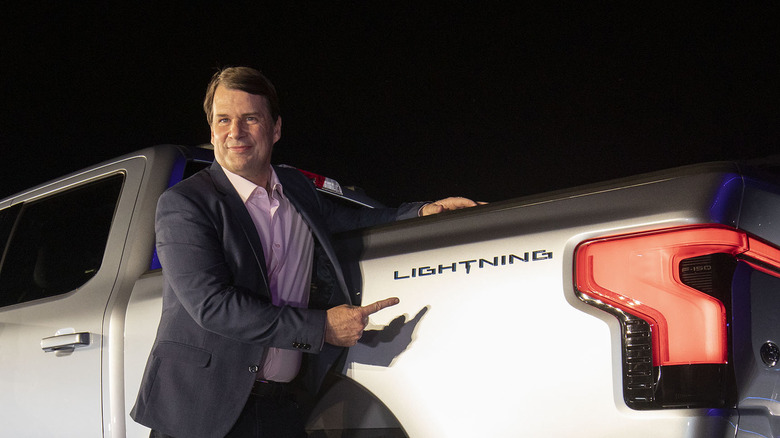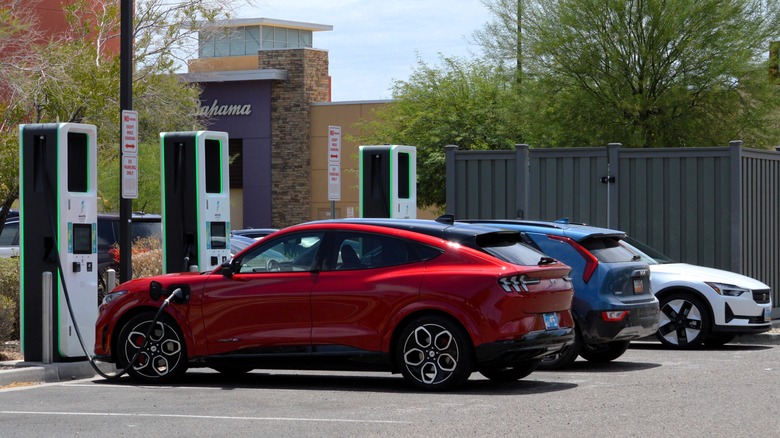Ford CEO Admits EV Market Will Be 'Way Smaller Than We Thought'
Ford has worked hard to pivot its historic auto business toward electric vehicles (EVs), with models like the beastly F-150 Lightning and speedy Mustang Mach-E representing a modern take on classic vehicles. But amid shifting economic and political ground, the company seems eager to temper market expectations. According to Ford's CEO, the EV market is poised to shrink significantly.
Speaking at the Ford Accelerate conference in Detroit, CEO Jim Farley addressed some tough realities about the market for electric vehicles (EVs). "Customers are not interested in a $75,000 electric vehicle," he said. "They find them interesting. They're fast. They're efficient. You don't go to the gas station, but they're expensive." Farley's comments came on the cusp of a massive shift for the EV market. President Donald Trump's spending package — the so-called "Big, Beautiful Bill" narrowly passed by Congress in July, slashing a long-standing, $7,500 tax incentive for electric vehicles. The credit had driven sales, helping many first-time EV owners overcome anxiety around the purchase. Elon Musk, arguably the largest beneficiary of government EV incentives, warned last summer that repealing the tax credit would "be devastating for our competitors and for Tesla slightly," though he insisted that autonomous driving decoupled his company from that risk. Tesla's quarterly sales skyrocketed as the tax credit ended.
Farley's assessment is of a more sober variety. "I think it's going to be a vibrant industry," he said, "but it's going to be smaller, way smaller than we thought." He also suggested that hybrids will remain popular in the meantime. It hardly takes a CEO's view of the market to come to that conclusion. Here's why EV sales are fighting an uphill battle without government assistance.
Pricing and convenience continue to push consumers toward gas vehicles
In 2025, Americans are buying a record-breaking number of electric vehicles, with over a million units sold through September. Ford placed third behind GM and Tesla for sales as the third-quarter figures rolled in, meaning this is one segment of the market where American manufacturers still lead the industry domestically. Even so, with total yearly auto sales projected at 16.2 million, EVs are nowhere close to taking over. With the end of the tax credit, Ford CEO Jim Farley projects a falloff in sales from 10% to 5% of the industry.
Electric cars have always been a tough sell, which is why the EV tax credits have historically existed. EV makers are asking people to give up a reliable and familiar internal combustion engine for a newfangled electric one, and getting people to leave their comfort zone is difficult. Moreover, the infrastructure needed to support wider adoption has struggled to materialize. There are more EV charge points than ever, but they tend to be clustered near population-dense areas, which makes switching harder for those who don't live near a city. That's an issue, since consumers often worry about the range they'll get from an EV.
But the biggest hurdle to EV ownership is still pricing. In a March survey from AAA, a meager 16% of 1,128 respondents said their next car was likely to be an EV, whereas 63% responded the opposite, with most citing concerns around battery repair costs and the price of the vehicle itself. Kelley Blue Book puts the average new EV at $57,245, a massive jump over new gas vehicles. Absent a tax incentive, slipping sales are in sight, which explains why Ford's next EV is a $30K pickup.

